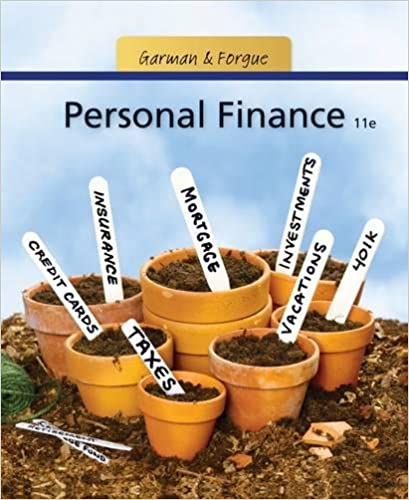Test Bank For Personal Finance 11th Edition by E. Thomas Garman
Digital item No Waiting Time Instant DownloadISBN-10 :1111531013 ISBN-13 :978-1111531010
In Stock
Original price was: $55.00.$25.00Current price is: $25.00.
Test Bank For Personal Finance 11th Edition by E. Thomas Garman
Chapter 2—Career Planning
TRUE/FALSE
1.Effective career planning will help you identify an employment pathway that aligns your interests and abilities with the tasks expected.
ANS: T PTS: 1 DIF: easy REF: p. 36
2.The time and effort you put into your career planning effort will affect how much income you earn and how far you advance in your career.
ANS: T PTS: 1 DIF: easy REF: p. 36
3.A career goal can be a specific job or field of work.
ANS: T PTS: 1 DIF: easy REF: p. 37
4.A career plan provides guidance to help you attain your career goals.
ANS: T PTS: 1 DIF: easy REF: p. 36
5.Interest inventories are the qualities that allow you to perform job-related tasks.
ANS: F
interest inventories help people assess the activities that give them satisfaction.
PTS: 1 DIF: easy REF: p. 37
6.According to the U.S. Census Bureau, adults with an advanced degree earn approximately $48,000 more per year than adults with only a high school diploma.
ANS: T PTS: 1 DIF: moderate REF: p. 37
7.According to the U.S. Census Bureau, adults with an advanced degree earn approximately $48,000 more per year than adults with only a bachelor’s degree.
ANS: F
those with advance degrees earn $26,000 more.
PTS: 1 DIF: moderate REF: p. 44
8.According to the U.S. Census Bureau, getting an advanced degree has a bigger impact on annual income (as compared to a bachelor’s degree) than getting a bachelor’s degree (as compared to graduating from high school).
ANS: T PTS: 1 DIF: moderate REF: p. 44
9.According to the U.S. Census Bureau, adults with a bachelor’s degree earn approximately $22,000 more per year than adults with only a high school diploma.
ANS: T PTS: 1 DIF: moderate REF: p. 44
10.An internship may allow you to develop new skills as well as a chance to network.
ANS: T PTS: 1 DIF: easy REF: p. 39


Reviews
There are no reviews yet.